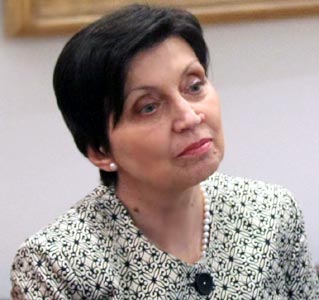At the end of 1949 an ocean-going ship left the port of Naples with 1,260 emigrants on board, their luggage consisting mostly of dreams of the Australian shores, friendly and warm as if they were born and grew up there. As the vessel touched shore, a lady from Bulgaria disembarked, a lady who was destined to spend half a century in exile before returning briefly home, a lady who, at the close of her life, made a gesture to her native country, never to be forgotten.
When they opened her last will and testament, Margarita Zaneff’s Australian lawyers were taken aback – the 95-year old lady had divided her worldly possessions between the National Gallery in Sofia and the Art Gallery of New South Wales in Sydney. Between the city where she met the love of her life and where her son was born, and the city where she built her second home and where she lost the people closest to her.
 The almost 2 million Leva which the Bulgarian immigrant in Australia left the National Gallery have been transferred to the gallery’s bank accounts. Its director Slava Ivanova admits there has never been such a generous donation. That is the reason why the National Gallery decided to track down Margarita Zaneff’s family and try to find out who she was and what drove her to make such a generous gesture.
The almost 2 million Leva which the Bulgarian immigrant in Australia left the National Gallery have been transferred to the gallery’s bank accounts. Its director Slava Ivanova admits there has never been such a generous donation. That is the reason why the National Gallery decided to track down Margarita Zaneff’s family and try to find out who she was and what drove her to make such a generous gesture.
“This mystery woman turned out to be really nice. The closer we got to what she was really like, the more her noble gesture stood out from a purely human point of view. She turned out to be such a nice, kind, ordinary person – in the good sense of the word,” says Slava Ivanova.
Margarita Zaneff was born on 11 April, 1921, the fourth child in a family living in Pogorelets village (now Yakimovo) near Montana. They named her Vurba after one of her grandmothers, but until the end of her life she used the name Greta (from Margaret, the name in her Australian passport). It was this name she signed her postcards to Bulgaria with. Her family tree includes a grandfather who was well received at the royal court and was mayor of the village for many years; her father was a relatively wealthy man who was able to send his eldest children to university. At that time Margarita was in secondary school in Sofia and dreaming of going to university in Munich. But fate had other things in store for her – she met the love of her life and abandoned her dreams of university. At the age of 19 she married Tsanko Tsanev who came from a famous family in Shoumen, and a year later their son Anton was born. In the mid-1940s the family left for Vienna and then emigrated to Australia. They settled in Sydney and led a quiet life – she worked as a typist, her husband – in public administration and their son was a lawyer. But both Tsanko and Anton died an untimely death and she ended her life in a nursing home leaving her family possessions to galleries.
But who was the man who stole her heart, turning all her plans around, and why did the two choose to defect?
“He was very fond of Bulgaria and the impossible dream of one day seeing it once more really saddened him,” says Slava Ivanova and adds that his defection was probably politically motivated. “Unlike his wife who came to Bulgaria on a brief visit in 2000, he never returned to the country where he was born. However he did dedicate poems to Bulgaria, under the pen-name Gord Balkan. In the last years of his life when he was seriously ill, he went to live in a place that reminded him of a mountain landscape in Bulgaria.”
“Margarita often talked about Bulgaria,” her accountant Alex Whitehead says. He says she hated the communists because they took everything her family had and that was the reason why she emigrated. But why did this quiet and unassuming lady, who loved music and flowers, decide to invest the family fortune in the fine arts, and on two continents? The answer to that question is something we may never find out. One thing is sure – that her name will remain under the paintings in testimony to her generosity. And that the fragrance of the white azalea planted in the family garden by her son Anton will continue to spread the memory of a family banished from their country, who nevertheless continued to carry it deep in their hearts.
English version: Milena Daynova
Photos: BGNES and nationalgallery.bgThe poster exhibition "The Armor of the Thracian Warriors" opens today in Kazanlak as part of the Festivals in the Valley of the Thracian Kings. It is the result of a joint scientific project of the National Archaeological Institute..
A school with the purpose of overcoming stereotypes about graffiti as something ugly, dirty and incomprehensible has been operating in Varna since 2019. Often the attitude towards graffiti artists is towards "people without..
The Bulgarian Antarctic Base was founded in 1988 and since 1993, by decree of President Zhelyu Zhelev, it has been named after St. Kliment Ohridski. Since then, Bulgarian Antarctic scientists have been conducting numerous experiments in the fields of..

+359 2 9336 661
